Analyzing the Impacts of Race on Health Policy Systems
VerifiedAdded on 2020/04/29
|6
|1451
|64
Essay
AI Summary
This essay examines the significant impacts of race on the Canadian health policy system, highlighting the pervasive issue of racism and its consequences on healthcare access and quality. It defines race and racism, emphasizing how racial biases lead to disparities in healthcare experiences and outcomes. The essay explores the historical context of racism in Canada, particularly affecting minority groups, and identifies factors contributing to health inequities, such as limited social and economic resources, risky health behaviors, and lack of trust in healthcare systems. It underscores the responsibility of both the government and healthcare organizations to implement inclusive policies and programs aimed at promoting cultural diversity and ensuring equitable access to care for all citizens. Furthermore, it emphasizes the roles of public awareness, policy enforcement, and the representation of marginalized groups in decision-making to eliminate racism within the healthcare system. The essay concludes by advocating for collaborative efforts among stakeholders to address racism and promote equality in healthcare.
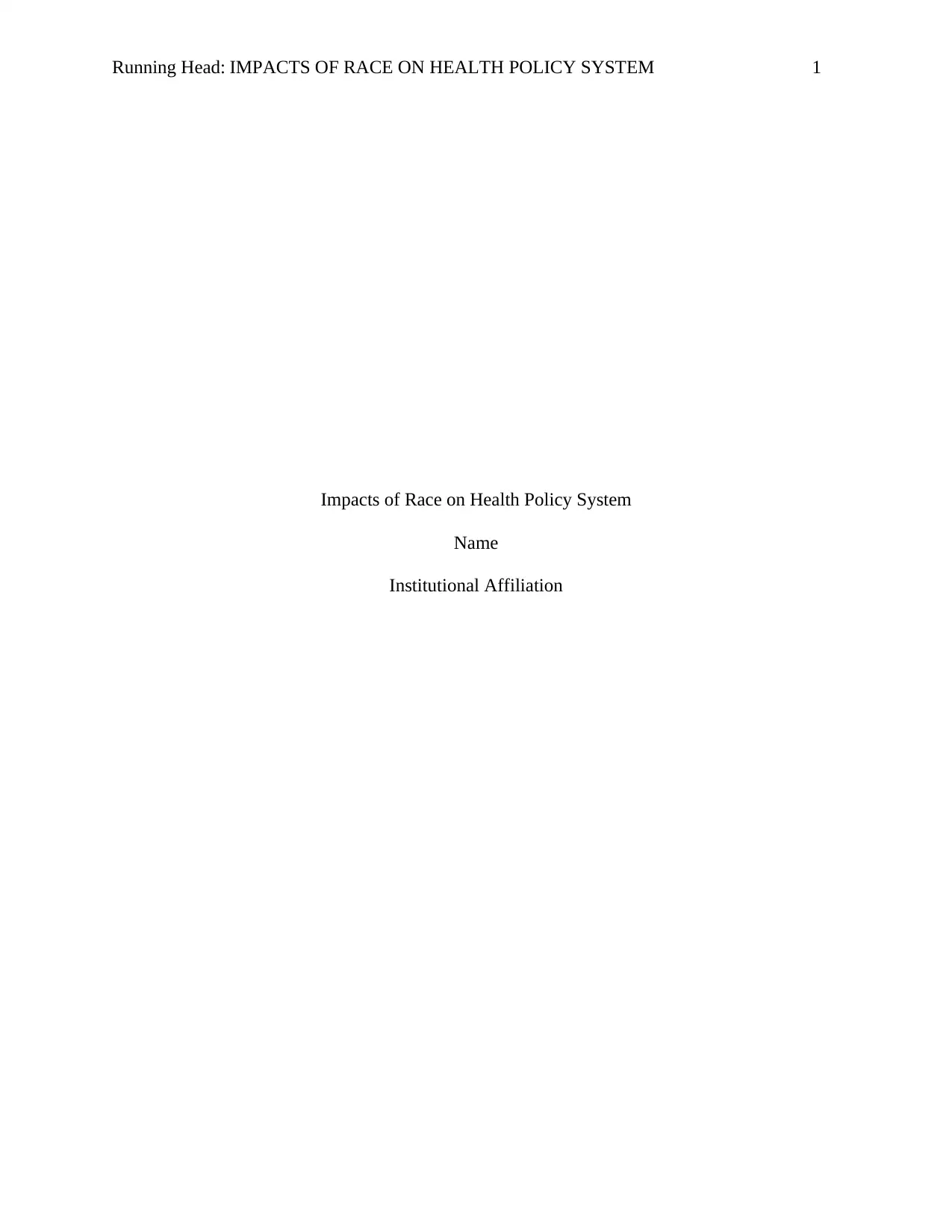
Running Head: IMPACTS OF RACE ON HEALTH POLICY SYSTEM 1
Impacts of Race on Health Policy System
Name
Institutional Affiliation
Impacts of Race on Health Policy System
Name
Institutional Affiliation
Paraphrase This Document
Need a fresh take? Get an instant paraphrase of this document with our AI Paraphraser
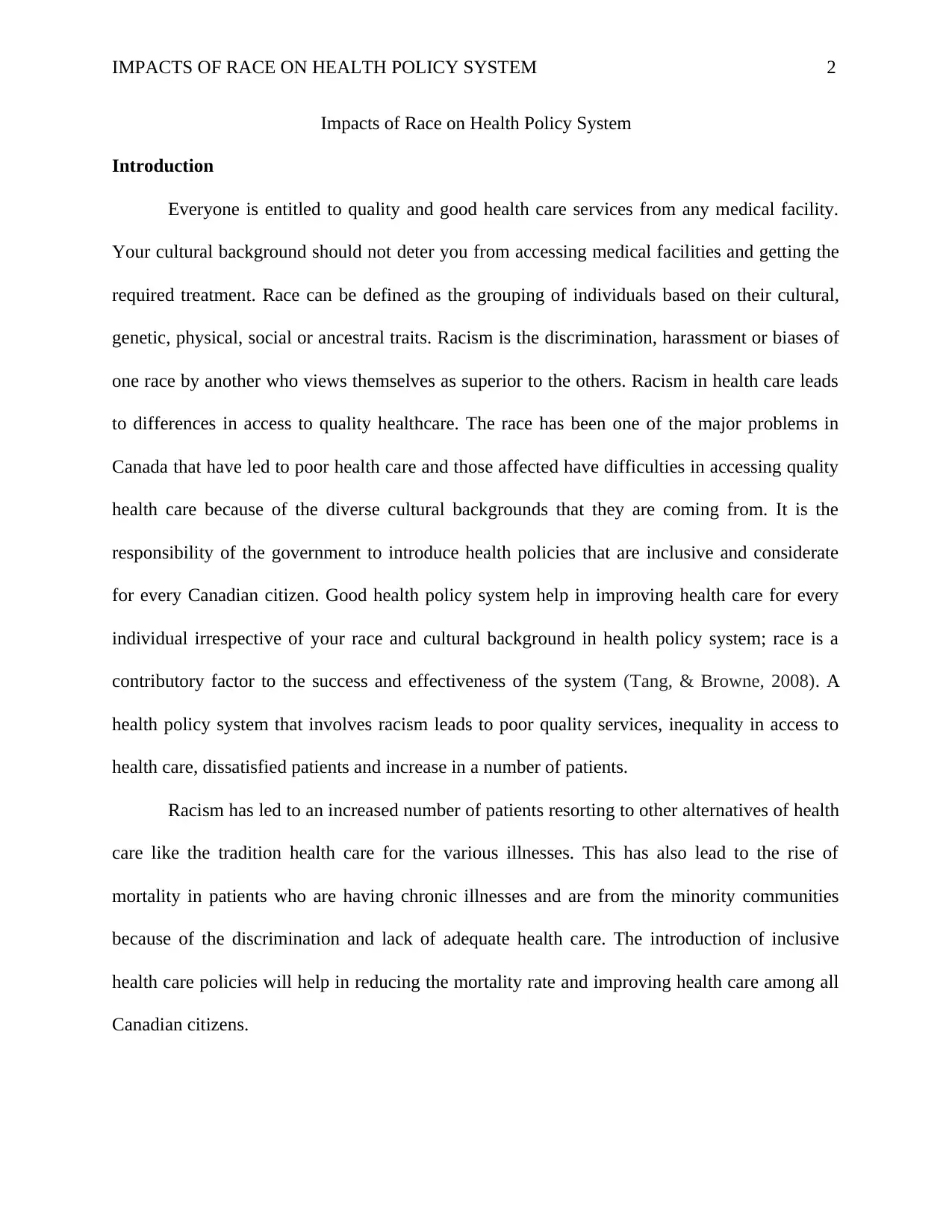
IMPACTS OF RACE ON HEALTH POLICY SYSTEM 2
Impacts of Race on Health Policy System
Introduction
Everyone is entitled to quality and good health care services from any medical facility.
Your cultural background should not deter you from accessing medical facilities and getting the
required treatment. Race can be defined as the grouping of individuals based on their cultural,
genetic, physical, social or ancestral traits. Racism is the discrimination, harassment or biases of
one race by another who views themselves as superior to the others. Racism in health care leads
to differences in access to quality healthcare. The race has been one of the major problems in
Canada that have led to poor health care and those affected have difficulties in accessing quality
health care because of the diverse cultural backgrounds that they are coming from. It is the
responsibility of the government to introduce health policies that are inclusive and considerate
for every Canadian citizen. Good health policy system help in improving health care for every
individual irrespective of your race and cultural background in health policy system; race is a
contributory factor to the success and effectiveness of the system (Tang, & Browne, 2008). A
health policy system that involves racism leads to poor quality services, inequality in access to
health care, dissatisfied patients and increase in a number of patients.
Racism has led to an increased number of patients resorting to other alternatives of health
care like the tradition health care for the various illnesses. This has also lead to the rise of
mortality in patients who are having chronic illnesses and are from the minority communities
because of the discrimination and lack of adequate health care. The introduction of inclusive
health care policies will help in reducing the mortality rate and improving health care among all
Canadian citizens.
Impacts of Race on Health Policy System
Introduction
Everyone is entitled to quality and good health care services from any medical facility.
Your cultural background should not deter you from accessing medical facilities and getting the
required treatment. Race can be defined as the grouping of individuals based on their cultural,
genetic, physical, social or ancestral traits. Racism is the discrimination, harassment or biases of
one race by another who views themselves as superior to the others. Racism in health care leads
to differences in access to quality healthcare. The race has been one of the major problems in
Canada that have led to poor health care and those affected have difficulties in accessing quality
health care because of the diverse cultural backgrounds that they are coming from. It is the
responsibility of the government to introduce health policies that are inclusive and considerate
for every Canadian citizen. Good health policy system help in improving health care for every
individual irrespective of your race and cultural background in health policy system; race is a
contributory factor to the success and effectiveness of the system (Tang, & Browne, 2008). A
health policy system that involves racism leads to poor quality services, inequality in access to
health care, dissatisfied patients and increase in a number of patients.
Racism has led to an increased number of patients resorting to other alternatives of health
care like the tradition health care for the various illnesses. This has also lead to the rise of
mortality in patients who are having chronic illnesses and are from the minority communities
because of the discrimination and lack of adequate health care. The introduction of inclusive
health care policies will help in reducing the mortality rate and improving health care among all
Canadian citizens.
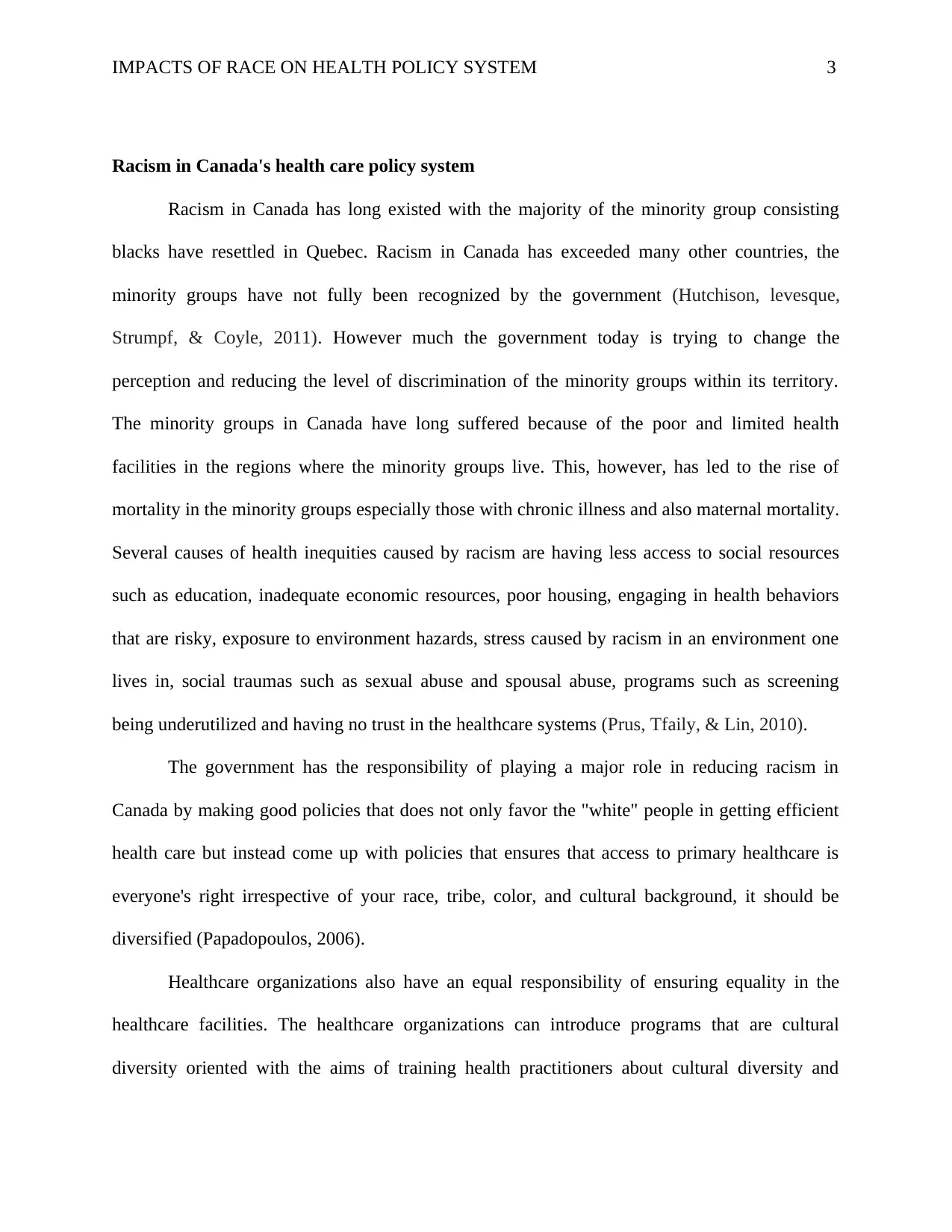
IMPACTS OF RACE ON HEALTH POLICY SYSTEM 3
Racism in Canada's health care policy system
Racism in Canada has long existed with the majority of the minority group consisting
blacks have resettled in Quebec. Racism in Canada has exceeded many other countries, the
minority groups have not fully been recognized by the government (Hutchison, levesque,
Strumpf, & Coyle, 2011). However much the government today is trying to change the
perception and reducing the level of discrimination of the minority groups within its territory.
The minority groups in Canada have long suffered because of the poor and limited health
facilities in the regions where the minority groups live. This, however, has led to the rise of
mortality in the minority groups especially those with chronic illness and also maternal mortality.
Several causes of health inequities caused by racism are having less access to social resources
such as education, inadequate economic resources, poor housing, engaging in health behaviors
that are risky, exposure to environment hazards, stress caused by racism in an environment one
lives in, social traumas such as sexual abuse and spousal abuse, programs such as screening
being underutilized and having no trust in the healthcare systems (Prus, Tfaily, & Lin, 2010).
The government has the responsibility of playing a major role in reducing racism in
Canada by making good policies that does not only favor the "white" people in getting efficient
health care but instead come up with policies that ensures that access to primary healthcare is
everyone's right irrespective of your race, tribe, color, and cultural background, it should be
diversified (Papadopoulos, 2006).
Healthcare organizations also have an equal responsibility of ensuring equality in the
healthcare facilities. The healthcare organizations can introduce programs that are cultural
diversity oriented with the aims of training health practitioners about cultural diversity and
Racism in Canada's health care policy system
Racism in Canada has long existed with the majority of the minority group consisting
blacks have resettled in Quebec. Racism in Canada has exceeded many other countries, the
minority groups have not fully been recognized by the government (Hutchison, levesque,
Strumpf, & Coyle, 2011). However much the government today is trying to change the
perception and reducing the level of discrimination of the minority groups within its territory.
The minority groups in Canada have long suffered because of the poor and limited health
facilities in the regions where the minority groups live. This, however, has led to the rise of
mortality in the minority groups especially those with chronic illness and also maternal mortality.
Several causes of health inequities caused by racism are having less access to social resources
such as education, inadequate economic resources, poor housing, engaging in health behaviors
that are risky, exposure to environment hazards, stress caused by racism in an environment one
lives in, social traumas such as sexual abuse and spousal abuse, programs such as screening
being underutilized and having no trust in the healthcare systems (Prus, Tfaily, & Lin, 2010).
The government has the responsibility of playing a major role in reducing racism in
Canada by making good policies that does not only favor the "white" people in getting efficient
health care but instead come up with policies that ensures that access to primary healthcare is
everyone's right irrespective of your race, tribe, color, and cultural background, it should be
diversified (Papadopoulos, 2006).
Healthcare organizations also have an equal responsibility of ensuring equality in the
healthcare facilities. The healthcare organizations can introduce programs that are cultural
diversity oriented with the aims of training health practitioners about cultural diversity and
⊘ This is a preview!⊘
Do you want full access?
Subscribe today to unlock all pages.

Trusted by 1+ million students worldwide
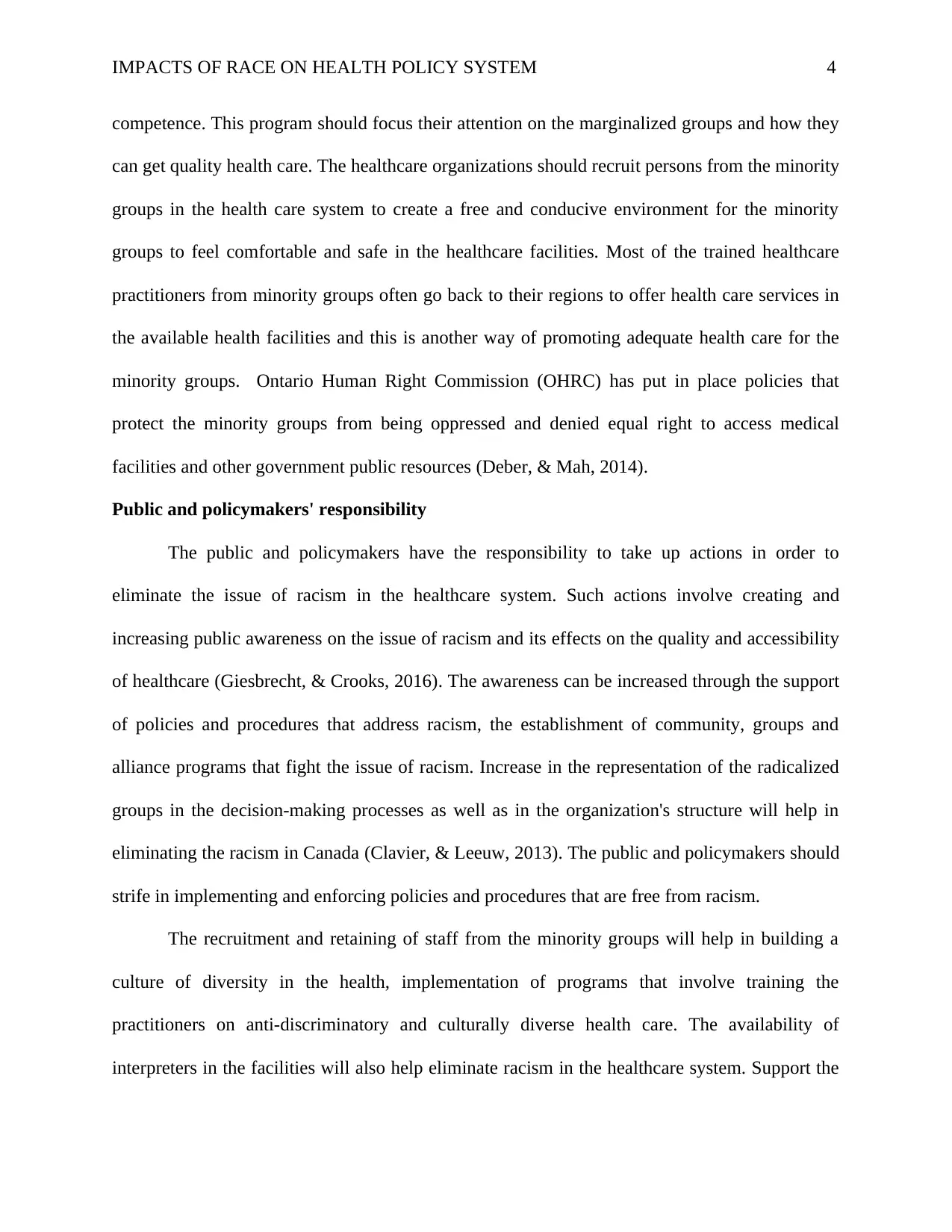
IMPACTS OF RACE ON HEALTH POLICY SYSTEM 4
competence. This program should focus their attention on the marginalized groups and how they
can get quality health care. The healthcare organizations should recruit persons from the minority
groups in the health care system to create a free and conducive environment for the minority
groups to feel comfortable and safe in the healthcare facilities. Most of the trained healthcare
practitioners from minority groups often go back to their regions to offer health care services in
the available health facilities and this is another way of promoting adequate health care for the
minority groups. Ontario Human Right Commission (OHRC) has put in place policies that
protect the minority groups from being oppressed and denied equal right to access medical
facilities and other government public resources (Deber, & Mah, 2014).
Public and policymakers' responsibility
The public and policymakers have the responsibility to take up actions in order to
eliminate the issue of racism in the healthcare system. Such actions involve creating and
increasing public awareness on the issue of racism and its effects on the quality and accessibility
of healthcare (Giesbrecht, & Crooks, 2016). The awareness can be increased through the support
of policies and procedures that address racism, the establishment of community, groups and
alliance programs that fight the issue of racism. Increase in the representation of the radicalized
groups in the decision-making processes as well as in the organization's structure will help in
eliminating the racism in Canada (Clavier, & Leeuw, 2013). The public and policymakers should
strife in implementing and enforcing policies and procedures that are free from racism.
The recruitment and retaining of staff from the minority groups will help in building a
culture of diversity in the health, implementation of programs that involve training the
practitioners on anti-discriminatory and culturally diverse health care. The availability of
interpreters in the facilities will also help eliminate racism in the healthcare system. Support the
competence. This program should focus their attention on the marginalized groups and how they
can get quality health care. The healthcare organizations should recruit persons from the minority
groups in the health care system to create a free and conducive environment for the minority
groups to feel comfortable and safe in the healthcare facilities. Most of the trained healthcare
practitioners from minority groups often go back to their regions to offer health care services in
the available health facilities and this is another way of promoting adequate health care for the
minority groups. Ontario Human Right Commission (OHRC) has put in place policies that
protect the minority groups from being oppressed and denied equal right to access medical
facilities and other government public resources (Deber, & Mah, 2014).
Public and policymakers' responsibility
The public and policymakers have the responsibility to take up actions in order to
eliminate the issue of racism in the healthcare system. Such actions involve creating and
increasing public awareness on the issue of racism and its effects on the quality and accessibility
of healthcare (Giesbrecht, & Crooks, 2016). The awareness can be increased through the support
of policies and procedures that address racism, the establishment of community, groups and
alliance programs that fight the issue of racism. Increase in the representation of the radicalized
groups in the decision-making processes as well as in the organization's structure will help in
eliminating the racism in Canada (Clavier, & Leeuw, 2013). The public and policymakers should
strife in implementing and enforcing policies and procedures that are free from racism.
The recruitment and retaining of staff from the minority groups will help in building a
culture of diversity in the health, implementation of programs that involve training the
practitioners on anti-discriminatory and culturally diverse health care. The availability of
interpreters in the facilities will also help eliminate racism in the healthcare system. Support the
Paraphrase This Document
Need a fresh take? Get an instant paraphrase of this document with our AI Paraphraser
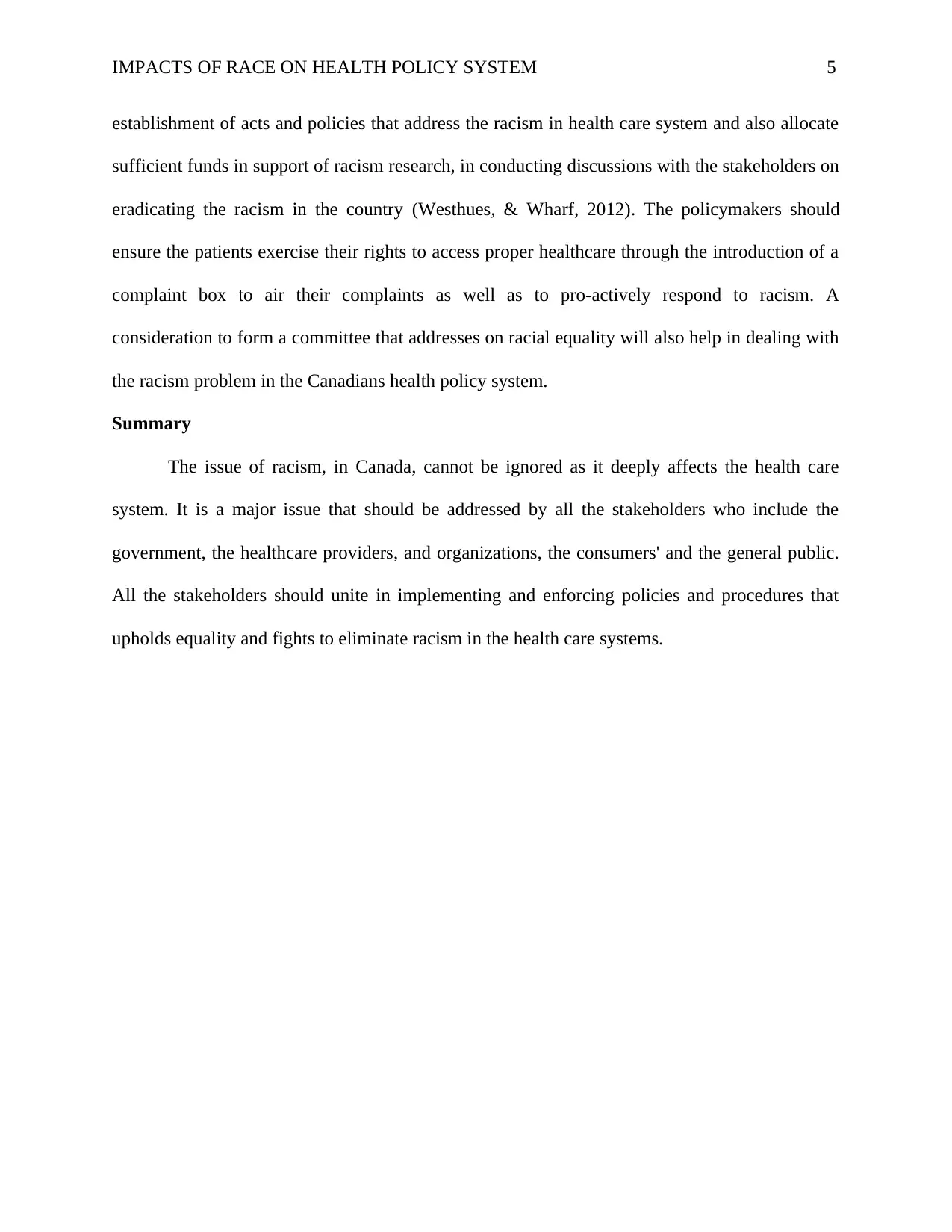
IMPACTS OF RACE ON HEALTH POLICY SYSTEM 5
establishment of acts and policies that address the racism in health care system and also allocate
sufficient funds in support of racism research, in conducting discussions with the stakeholders on
eradicating the racism in the country (Westhues, & Wharf, 2012). The policymakers should
ensure the patients exercise their rights to access proper healthcare through the introduction of a
complaint box to air their complaints as well as to pro-actively respond to racism. A
consideration to form a committee that addresses on racial equality will also help in dealing with
the racism problem in the Canadians health policy system.
Summary
The issue of racism, in Canada, cannot be ignored as it deeply affects the health care
system. It is a major issue that should be addressed by all the stakeholders who include the
government, the healthcare providers, and organizations, the consumers' and the general public.
All the stakeholders should unite in implementing and enforcing policies and procedures that
upholds equality and fights to eliminate racism in the health care systems.
establishment of acts and policies that address the racism in health care system and also allocate
sufficient funds in support of racism research, in conducting discussions with the stakeholders on
eradicating the racism in the country (Westhues, & Wharf, 2012). The policymakers should
ensure the patients exercise their rights to access proper healthcare through the introduction of a
complaint box to air their complaints as well as to pro-actively respond to racism. A
consideration to form a committee that addresses on racial equality will also help in dealing with
the racism problem in the Canadians health policy system.
Summary
The issue of racism, in Canada, cannot be ignored as it deeply affects the health care
system. It is a major issue that should be addressed by all the stakeholders who include the
government, the healthcare providers, and organizations, the consumers' and the general public.
All the stakeholders should unite in implementing and enforcing policies and procedures that
upholds equality and fights to eliminate racism in the health care systems.
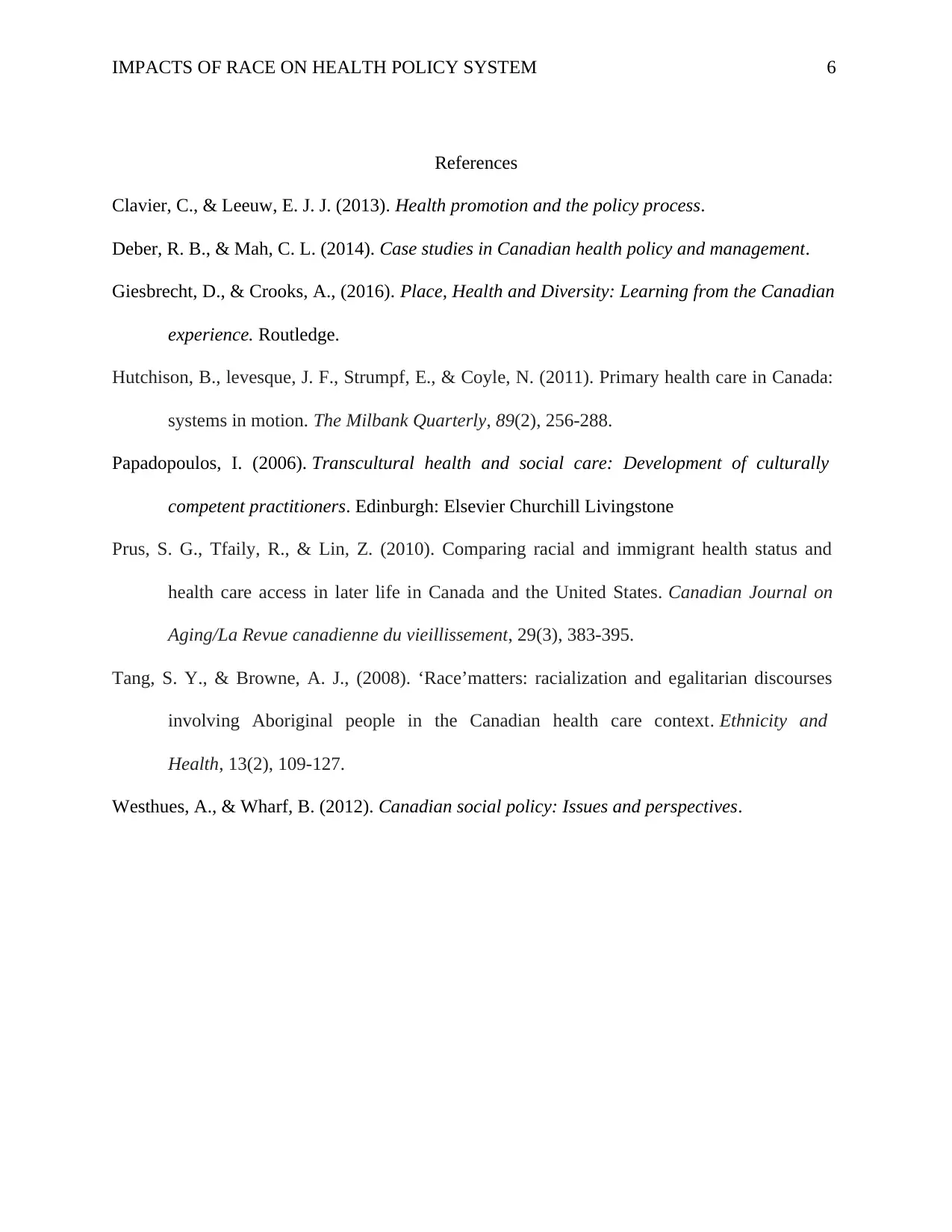
IMPACTS OF RACE ON HEALTH POLICY SYSTEM 6
References
Clavier, C., & Leeuw, E. J. J. (2013). Health promotion and the policy process.
Deber, R. B., & Mah, C. L. (2014). Case studies in Canadian health policy and management.
Giesbrecht, D., & Crooks, A., (2016). Place, Health and Diversity: Learning from the Canadian
experience. Routledge.
Hutchison, B., levesque, J. F., Strumpf, E., & Coyle, N. (2011). Primary health care in Canada:
systems in motion. The Milbank Quarterly, 89(2), 256-288.
Papadopoulos, I. (2006). Transcultural health and social care: Development of culturally
competent practitioners. Edinburgh: Elsevier Churchill Livingstone
Prus, S. G., Tfaily, R., & Lin, Z. (2010). Comparing racial and immigrant health status and
health care access in later life in Canada and the United States. Canadian Journal on
Aging/La Revue canadienne du vieillissement, 29(3), 383-395.
Tang, S. Y., & Browne, A. J., (2008). ‘Race’matters: racialization and egalitarian discourses
involving Aboriginal people in the Canadian health care context. Ethnicity and
Health, 13(2), 109-127.
Westhues, A., & Wharf, B. (2012). Canadian social policy: Issues and perspectives.
References
Clavier, C., & Leeuw, E. J. J. (2013). Health promotion and the policy process.
Deber, R. B., & Mah, C. L. (2014). Case studies in Canadian health policy and management.
Giesbrecht, D., & Crooks, A., (2016). Place, Health and Diversity: Learning from the Canadian
experience. Routledge.
Hutchison, B., levesque, J. F., Strumpf, E., & Coyle, N. (2011). Primary health care in Canada:
systems in motion. The Milbank Quarterly, 89(2), 256-288.
Papadopoulos, I. (2006). Transcultural health and social care: Development of culturally
competent practitioners. Edinburgh: Elsevier Churchill Livingstone
Prus, S. G., Tfaily, R., & Lin, Z. (2010). Comparing racial and immigrant health status and
health care access in later life in Canada and the United States. Canadian Journal on
Aging/La Revue canadienne du vieillissement, 29(3), 383-395.
Tang, S. Y., & Browne, A. J., (2008). ‘Race’matters: racialization and egalitarian discourses
involving Aboriginal people in the Canadian health care context. Ethnicity and
Health, 13(2), 109-127.
Westhues, A., & Wharf, B. (2012). Canadian social policy: Issues and perspectives.
⊘ This is a preview!⊘
Do you want full access?
Subscribe today to unlock all pages.

Trusted by 1+ million students worldwide
1 out of 6
Related Documents
Your All-in-One AI-Powered Toolkit for Academic Success.
+13062052269
info@desklib.com
Available 24*7 on WhatsApp / Email
![[object Object]](/_next/static/media/star-bottom.7253800d.svg)
Unlock your academic potential
Copyright © 2020–2026 A2Z Services. All Rights Reserved. Developed and managed by ZUCOL.





